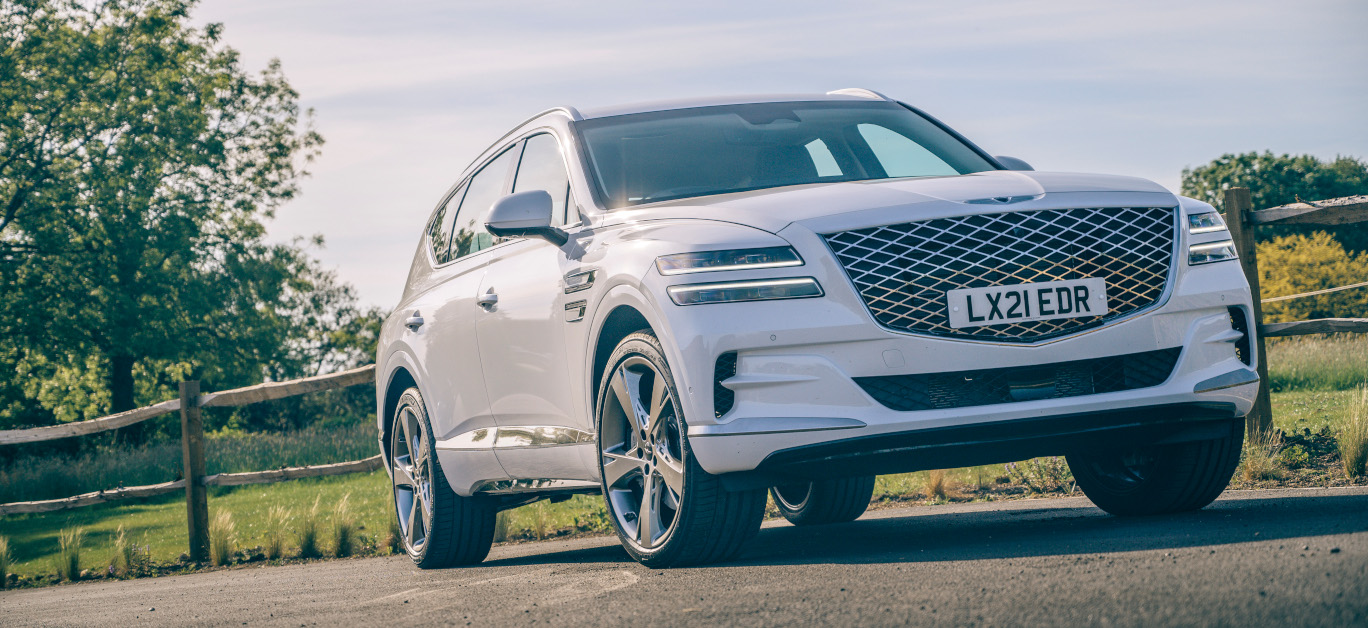Back in late 2015, a new luxury car marque with global ambition arrived on the automobile scene. Genesis was launched by Hyundai Motor as an all-new global luxury car brand with a range of models from saloons to SUVs, created with the highest standards of performance, design and innovation.
Targeted at a new generation of discerning consumers, the Genesis marque is positioned as a stand-alone brand that operates alongside the company’s popular Hyundai marque with an ambition to compete head-on with the world’s most renowned luxury car brands. It’s a bold ambition given the plethora of more established luxury brands operating within the sector. However, Hyundai believe that with Genesis, they have created enough points of difference to entice luxury consumers away from the traditional marques that have captured this market to date.
Genesis announced that its business model “will embody four key aspects: human-focused innovation; refined and balanced performance; athletic elegance in design; and, hassle-free customer experience”.
“We have created this new Genesis brand with a complete focus on our customers who want smart ownership experiences that save time and effort, with practical innovations that enhance satisfaction. The Genesis brand will fulfil these expectations, becoming a market leader through our human-centred brand strategy,” said Euisun Chung, Hyundai Motor Company vice chairman, at the brand’s launch a little over five years ago.
Genesis places much focus on the importance of the hassle-free customer experience, noting that in today’s world, time itself is a luxury, and delivering a service that facilitates consumers having more time to spend doing what’s important to them is a value adding element of the proposition.
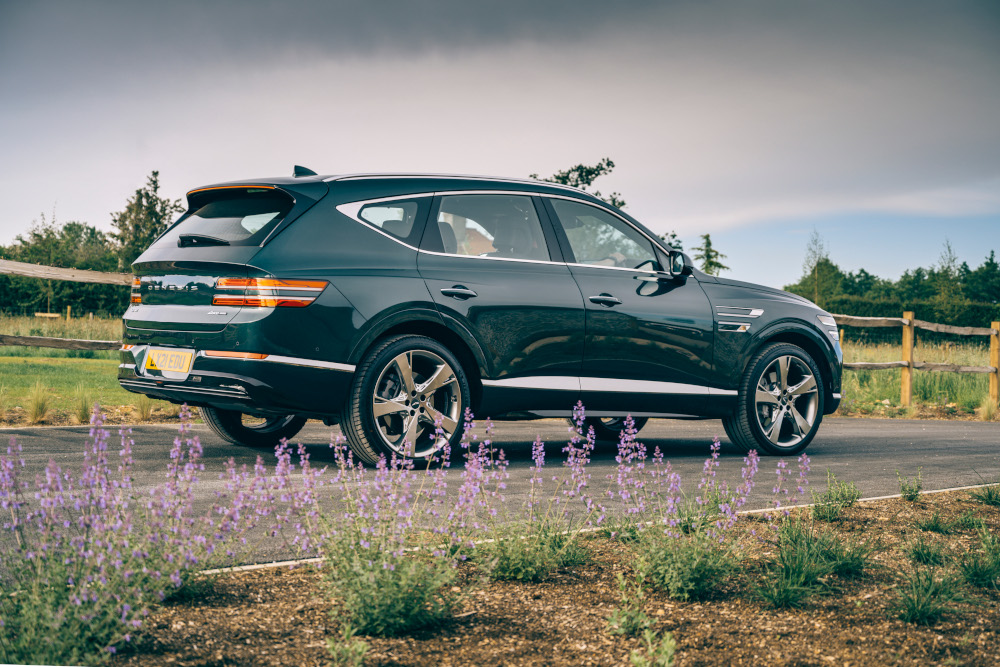
There is a commitment to separating Genesis from its Hyundai link in terms of its look and feel. Hyundai have worked to elevate and differentiate the Genesis brand, establishing a new and distinct design identity, emblem, a bespoke naming structure and they are focusing on this strong customer service offering.
To deliver this distinctive and differentiated design for the new Genesis brand vehicles, Hyundai created a new Prestige Design Division, bringing in individuals with expertise and experience from the likes of Audi, Bentley and Lamborghini. The name ‘Genesis’, which also means new beginnings, hints at the new values and standards that the brand will bring to the global luxury car market. There has been a specific roll-out launch strategy, with Genesis initially on sale in the Korean, Chinese, North American and Middle Eastern luxury car markets before it has been brought to Europe and the UK.
As a new luxury brand, Genesis naturally has a focus on driving dynamics and design, but a core component of the Genesis brand is this customer focused vision originating from its Korean heritage and a philosophy whereby the customer is seen as a guest. This means that your Genesis journey before, during and after purchase is led by an appointed Genesis personal assistant.
Once a Genesis owner, respectful of the client’s time and the value of lost time, the personal assistant will arrange collection and delivery of your car to and from your home for scheduled servicing, as one example. It’s all part of what Genesis sees as the epitome of luxury – ensuring ownership of Genesis luxury vehicles is as simple as possible, simplicity being ‘the ultimate sophistication’. Genesis personal assistants are recruited from the likes of the luxury retail sector to ensure they understand the expectations of luxury clients, providing rapid and attentive service to customer requests.
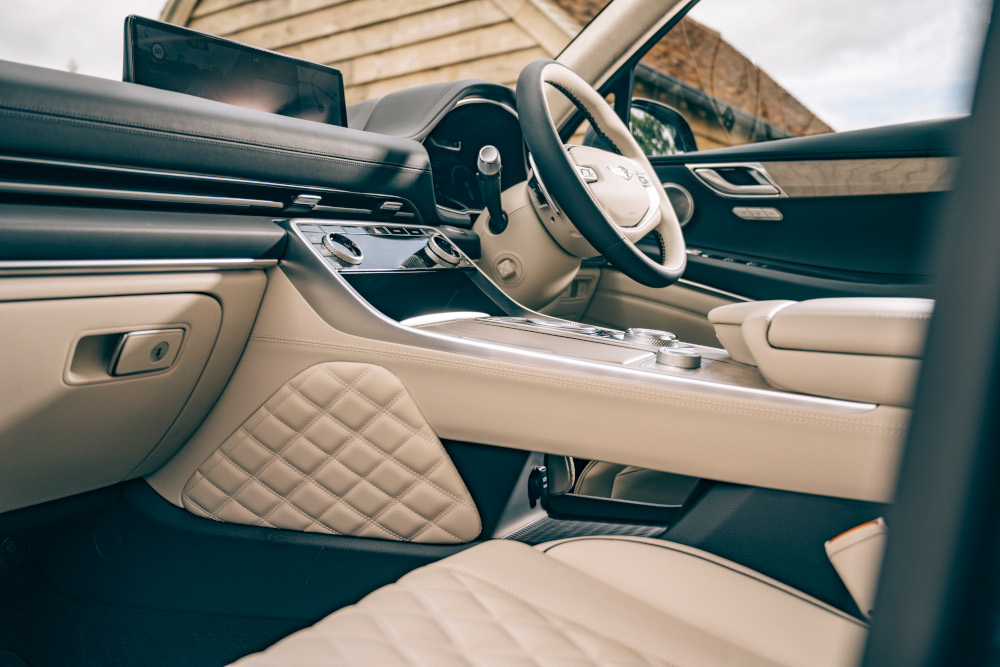
For one week in Scotland, I’m driving the Genesis GV80, its stunning luxury flagship SUV. Launched into the range in early 2020, William Lee, executive vice president and global head of the Genesis brand, described the GV80 as representing ‘the essence of the innovative spirit of Genesis’ and the ‘V’ in the GV80 marque representing ‘versatility’, summarising the vehicle’s multi-purpose nature, from luxury executive car to family car to off-roader.
There is no doubt that this is a striking SUV. It’s a combination of both bold and sleek, with a sporty design feel despite its size. Genesis models are all badged with a wing-type emblem and this sits above the GV80’s large and dominant crest grille at the front, the grille being a signature design element of Genesis. The crest grille is flanked by the Genesis ‘Quad Lamps’, another key design element. These four rectangular lights at the front are a distinctive feature and they are replicated at the rear and inspired by the wings of the Genesis motif.
The beautifully curved body structure of the GV80 is enhanced with hot-stamped, high-strength steel, as well as lightweight aluminium used on the doors, hood, and tailgate that allow it to achieve competitive curb weight. There’s an element of the Bentley Bentayga about its overall shape and look. Genesis describes the design of the GV80 as ‘athletic elegance’ and it’s a fair and positive reflection.
Inside the GV80 is a seven-seater and the cabin is spacious and airy, simple and sleek. The interior design is said to focus on ‘the beauty of white space,’ something which is characteristic of the elegant South Korean architectural philosophy. The concept of ‘luxury in space’ defines the open feeling of the cabin of the GV80, with SangYup Lee, senior vice president and head of Genesis Design, commenting: “we were able to express a luxurious feel for the interior of GV80 through reductive design and channelling the Korean roots of the Genesis brand”.
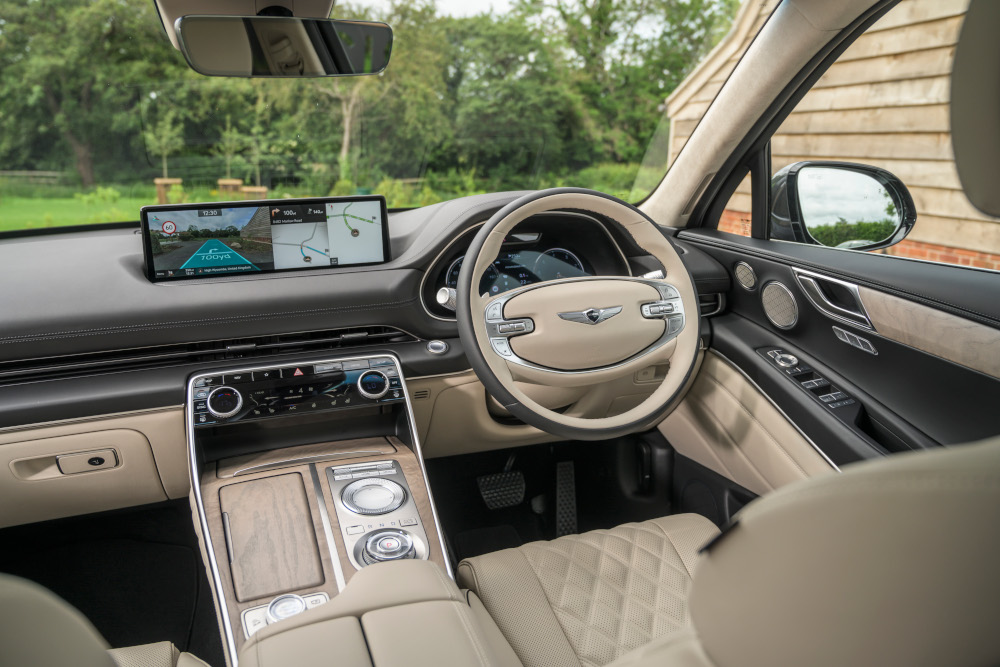
The width of the interior of the GV80 is emphasized through the design of sleek, thin air vents that run across the passenger compartment. A 14.5-inch, split-screen infotainment display sits front and centre atop the dashboard. The number of hard buttons and switches is intentionally kept to a minimum, both for aesthetic purposes and ease of use. In the high spec models, soft materials cover every surface, from the inside of the door handles to the quilted knee pads that line the lower sides of the console. For those in the back, the seats recline like those in the premium seats of an aeroplane and are made of plush leather with detailed stitching abounds.
I’m driving a three-litre six-cylinder diesel engine all wheel drive. The GV80 is designed for refinement, it’s a beautiful car for long journeys. In its comfort mode, it is quite sedate off the blocks, accelerating smoothly and graciously, but with no real kick when you push on the accelerator.
You need to switch to sport mode if you want a punchier drive and you want to feel more of the benefit of the three-litre engine. When you do, the seats tighten around your lower and upper back and there’s more of a growl from the engine, indeed in the restricted 20mph zones of the city, in sport mode, the car feels constrained, itching for the freedom of the open road. In this mode, touch the accelerator and the car roars forward with wonderful gusto.
Overall, comfort or sport mode, it’s a great driving experience, Genesis achieving their aim of ‘excellent ride comfort while retaining confident sportiness.’
Like each member of the Genesis line-up, the GV80 provides an unmatched level of standard active and passive safety systems, as part of a brand-level engineering commitment to passenger security and comfort. “When it comes to safety, GV80 is designed not only to offer protection to its occupants in the event of an accident, but also from accidents from happening at all,” Genesis states.
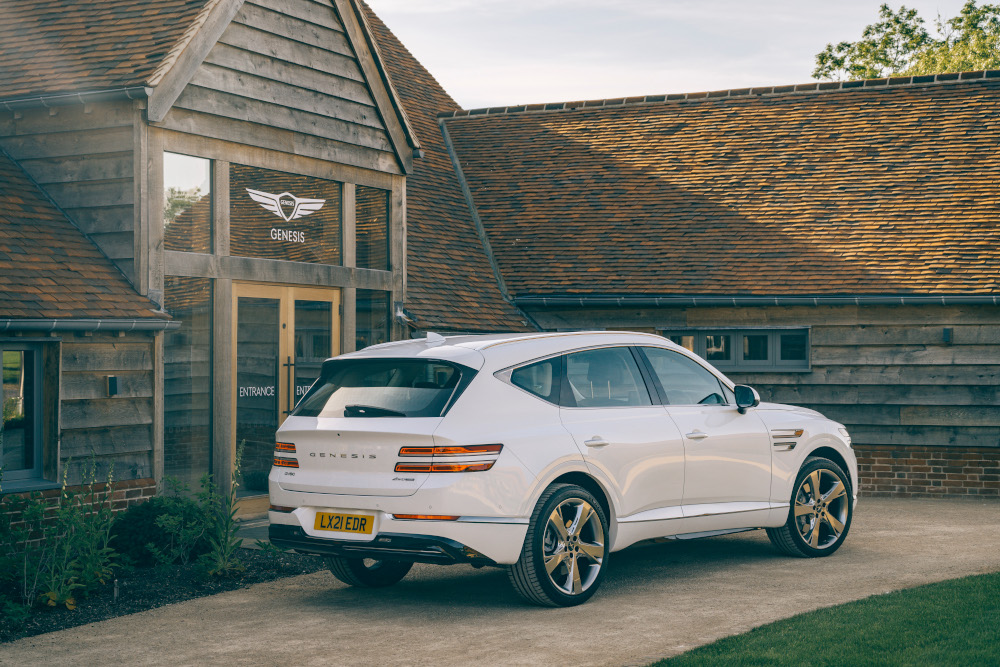
There are many impressive features from the Ergo Motion Driver’s Seat that contains seven air cells to reduce fatigue from long hours of driving to the GV80’s world first application of Road Active Noise Cancellation (RANC) technology, which dramatically reduces road noise while driving. Based on the science of digital signal processing, RANC overcomes the limitations of existing noise control technologies that rely on physical technology, such as materials and body structures, to quiet the cabin. RANC generates sound waves of opposite phases in 0.002 second by analysing road noise in real time, dramatically reducing irregular, simultaneous road noise.
The array of advanced driver-assistance systems (ADAS) also includes several world-first technologies from Genesis. To name a few: Smart Cruise Control with Machine Learning (SCC-ML), an artificial intelligence-based navigation technology that helps enable the GV80 to independently learn the driving characteristics of its drivers and implement autonomous driving similar to that of human drivers.
Highway Driving Assist II (HDA II) helps assist the driver in a wider variety of situations than before, including lane change when the turn signal is used, and helping to merge in congested situations, while Forward Collision-Avoidance Assist (FCA), automatically bringing the GV80 to a stop in certain situations where there is a risk of collision with an approaching vehicle on the left or right side of an intersection.
Blind-Spot Collision Avoidance Assist (BCA) helps reduce the chance of potential impact with a moving vehicle, upon departing a parallel parking spot as one example, while Driver Attention Alert Warning (DAW) monitors the driver’s attention by analysing driving patterns and behaviours, including intermittent steering and unnatural deceleration, through vehicle signals, such as steering angle and steering torque and vehicle position in traffic lane. A forward-looking camera monitors the driver and will generate pop-up messages and warning tones when fatigue or forward-looking neglect is detected.
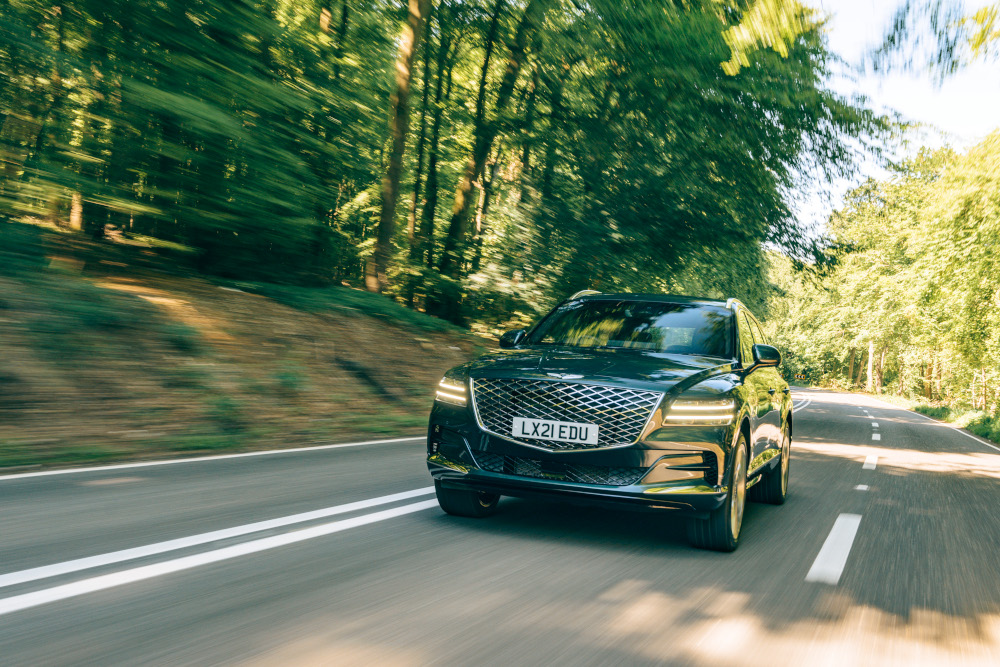
The GV80 also includes 10 standard airbags, including a centre-mounted airbag between the front occupants to mitigate interior impact. All in all, it’s packed full of the latest safety features to protect both occupants and those outside of the vehicle.
Whilst driving the streets of Edinburgh, now a city awash with cycle lanes, I appreciated the cameras which surround the vehicle. Put on an indicator to turn left at a junction as an example and a camera on the dashboard highlights what’s behind you on your inside left, helping to ensure that there are no cyclists coming up the inside before you turn.
The GV80 is a luxurious car, as well as a practical family car. If you’re piling in lots of children, it’s a seven-seater vehicle. It’s also designed to head off the tarmac and onto rougher and tougher ground. It can easily switch into modes for snow, mud and sand.
It’s a challenging move launching a new luxury car marque into a market already well served with long established luxury marques at a wide range of prices from Jaguar and Mercedes to Maserati and Bentley. If the Genesis GV80 is anything to go by, the bold ambition certainly has the foundations to succeed, the GV80 providing a sophisticated, luxurious, stylish and functional SUV that more than matches many of its immediate rivals in both looks and performance.
The GV80 would be matched against the likes of the BMW X5, Mercedes GLE, Lexus RX, Range Rover Sport or Volvo XC90.
Throughout the week that I drove the Genesis GV80, it was a genuine head-turner – parked on the street, pedestrians stopped to admire it and I even watched some cars slow to a halt alongside to take a closer look. It’s perhaps a combination of both its striking and arresting looks and the fact that it’s relatively unknown in the UK as a marque, having only just launched and indeed, at the time of writing, having delivered only seven Genesis vehicles to customers in the UK. Big, bold and striking, I don’t think it will be long before this is a highly sought-after SUV.
The Genesis GV80 starts at £56,715 in the UK. Find out more at genesis.com.
With thanks to the Genesis UK Press Office for supply of a Genesis GV80 for this review












